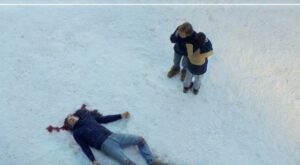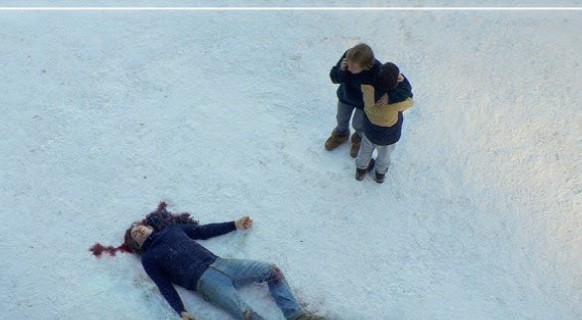Movie Info
Movie Info
- Director
- Justine Triet
- Run Time
- 2 hours and 31 minutes
- Rating
- R
VP Content Ratings
- Violence
- 2/10
- Language
- 2/10
- Sex & Nudity
- 1/10
- Star Rating
Relevant Quotes
Keep far from a false charge, and do not kill the innocent and those in the right, for I will not acquit the guilty.

French director-cowriter Justine Triet’s Anatomy of a Fall is a fascinating courtroom drama that will leave you wondering. Though a victim’s fall is indeed exhaustively analyzed by police experts, the title might well be a reference to the fall of a marriage, with a son caught between his father and mother.
When we first meet her Sandra Voyter (Sandra Hüller) is a famous writer being interviewed by an eager student in an isolated ski chalet in the Alps near the town of Grenoble. Suddenly their conversation is drowned out by a blast of loud music. Sandra’s husband Samuel (Samuel Theis), also a writer, is up in the attic repairing the ceiling. It is no accident that he has turned on music as loud as a steamboat’s whistle, with it bringing the interview to a forced ending.
After the interviewer leaves, the couple’s blind son Daniel (Milo Machado Graner) takes their dog for a walk, and when he returns finds the body of his father, his head bleeding profusely. From then on, the film lurches between theories of suicide or murder. If the latter, then Sandra must be the guilty one, or so argues the prosecutor when he brings her to trial.
An important part of the prosecutor’s case is that Sandra in her writings promises her readers that her fiction also contains hints of truth. As the trial progresses, with public opinion against the mother, son Daniel becomes more important to the outcome. He—and we—have witnessed the slow destruction of the marriage, with Samuel apparently envious of his wife’s greater success. Daniel conducts an experiment with his dog that will have serious consequences for his testimony which he gives at the end of the trial.
According to Exodus, Moses gave instructions concerning “a false charge” and “the innocent,” but Justine Triet leaves us wondering at the end about the mother and son. Daniel has already lost his father. Is he going to lose his mother as well by his testimony? This is a good film to see with at least one other person so you can discuss, and maybe debate, the jury’s verdict at the end.
This review will be in the December issue of VP along with a set of questions for reflection and/or discussion. If you have found reviews on this site helpful, please consider purchasing a subscription or individual issue in The Store.

